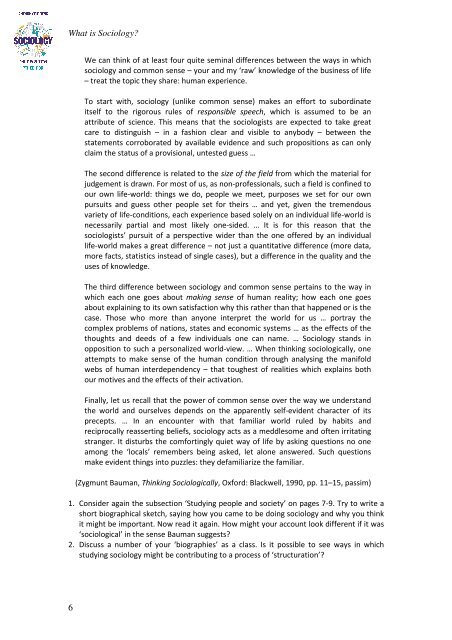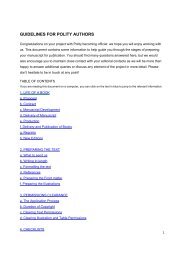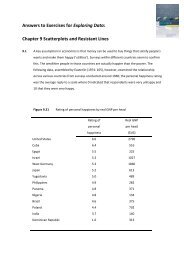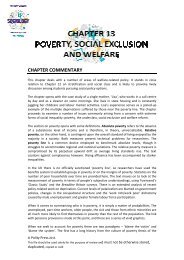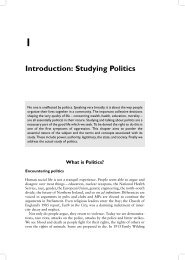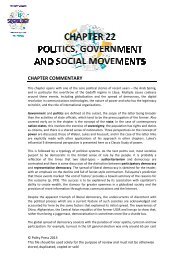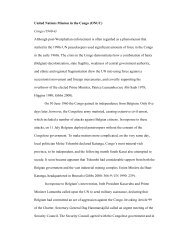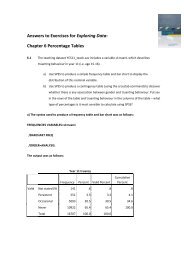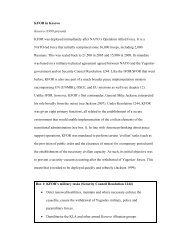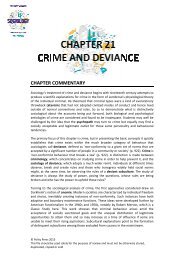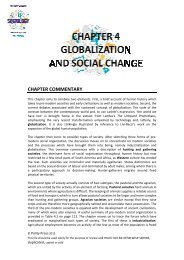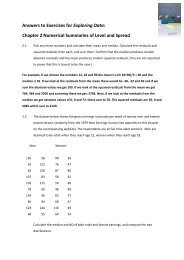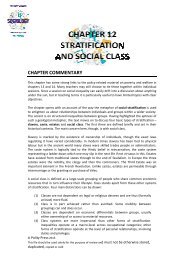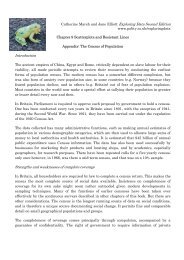Chapter 1 - Polity
Chapter 1 - Polity
Chapter 1 - Polity
You also want an ePaper? Increase the reach of your titles
YUMPU automatically turns print PDFs into web optimized ePapers that Google loves.
What is Sociology?<br />
We can think of at least four quite seminal differences between the ways in which<br />
sociology and common sense – your and my ‘raw’ knowledge of the business of life<br />
– treat the topic they share: human experience.<br />
To start with, sociology (unlike common sense) makes an effort to subordinate<br />
itself to the rigorous rules of responsible speech, which is assumed to be an<br />
attribute of science. This means that the sociologists are expected to take great<br />
care to distinguish – in a fashion clear and visible to anybody – between the<br />
statements corroborated by available evidence and such propositions as can only<br />
claim the status of a provisional, untested guess …<br />
The second difference is related to the size of the field from which the material for<br />
judgement is drawn. For most of us, as non-professionals, such a field is confined to<br />
our own life-world: things we do, people we meet, purposes we set for our own<br />
pursuits and guess other people set for theirs … and yet, given the tremendous<br />
variety of life-conditions, each experience based solely on an individual life-world is<br />
necessarily partial and most likely one-sided. … It is for this reason that the<br />
sociologists’ pursuit of a perspective wider than the one offered by an individual<br />
life-world makes a great difference – not just a quantitative difference (more data,<br />
more facts, statistics instead of single cases), but a difference in the quality and the<br />
uses of knowledge.<br />
The third difference between sociology and common sense pertains to the way in<br />
which each one goes about making sense of human reality; how each one goes<br />
about explaining to its own satisfaction why this rather than that happened or is the<br />
case. Those who more than anyone interpret the world for us … portray the<br />
complex problems of nations, states and economic systems … as the effects of the<br />
thoughts and deeds of a few individuals one can name. … Sociology stands in<br />
opposition to such a personalized world-view. … When thinking sociologically, one<br />
attempts to make sense of the human condition through analysing the manifold<br />
webs of human interdependency – that toughest of realities which explains both<br />
our motives and the effects of their activation.<br />
Finally, let us recall that the power of common sense over the way we understand<br />
the world and ourselves depends on the apparently self-evident character of its<br />
precepts. … In an encounter with that familiar world ruled by habits and<br />
reciprocally reasserting beliefs, sociology acts as a meddlesome and often irritating<br />
stranger. It disturbs the comfortingly quiet way of life by asking questions no one<br />
among the ‘locals’ remembers being asked, let alone answered. Such questions<br />
make evident things into puzzles: they defamiliarize the familiar.<br />
(Zygmunt Bauman, Thinking Sociologically, Oxford: Blackwell, 1990, pp. 11–15, passim)<br />
1. Consider again the subsection ‘Studying people and society’ on pages 7-9. Try to write a<br />
short biographical sketch, saying how you came to be doing sociology and why you think<br />
it might be important. Now read it again. How might your account look different if it was<br />
‘sociological’ in the sense Bauman suggests?<br />
2. Discuss a number of your ‘biographies’ as a class. Is it possible to see ways in which<br />
studying sociology might be contributing to a process of ‘structuration’?<br />
6


